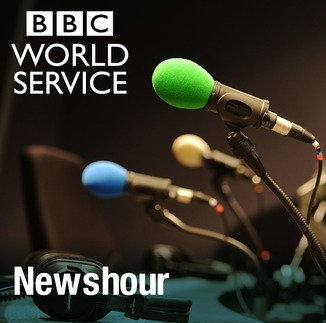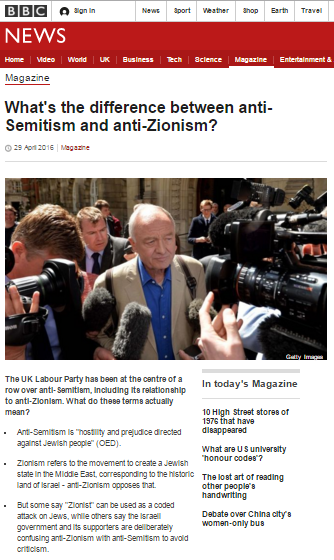The August 17th afternoon edition of the BBC World Service radio programme ‘Newshour‘ included an item (from 48:46 here) which was introduced by presenter Rebecca Kesby using the standard sanitised BBC portrayal of the ‘Great Return March‘ violent rioting and with the firing of hundreds of rockets and mortars at Israeli civilians by terror factions erased from audience view.
Kesby: “Egypt has taken on a big task, apparently organising and implementing a truce deal between Israel and Hamas in the Gaza Strip. The agreement is reportedly aimed at calming weeks of border clashes between the Gaza Strip and Israel and is planned ahead of the Muslim Adha feast which starts next week.”
On the same day, however, Israeli media outlets reported that Hamas officials had stated that no agreement would be reached before Eid al Adha.
“A member of the Hamas terror group’s political bureau said Friday that internal Palestinian talks on a long-term ceasefire agreement with Israel were put on pause until the conclusion of a Muslim holiday later this month.
“Today we finished a round of consultations in Cairo with the Palestinian factions regarding the calm [ceasefire deal] and the reconciliation” between Hamas and Palestinian Authority President Mahmoud Abbas’s Fatah party, Izzat al-Rishq wrote on his Twitter account, according to Channel 10 news.
“We made clear that we insist that all steps be in a national framework. We presented our vision regarding the calm and we heard ideas and comments from the brothers in the factions,” added al-Rishq, one of the Gaza-based terror group’s top leaders abroad.
“God willing the efforts will renew after the holiday” of Eid al-Adha, a Muslim feast that begins on Tuesday and lasts until the end of next week.”
Kesby then went on to introduce Anshel Pfeffer of Ha’aretz and BBC audiences were told that the potential truce includes several factors.
Pfeffer: “The main component of the deal – which is an unofficial understanding, not a written treaty that either side is signing – is that Hamas is committed to a complete ceasefire.”
Listeners were not told that Hamas’ interpretation of “a complete ceasefire” does not – as the Times of Israel explains – in fact include what Kesby euphemistically described as “border clashes” in her introduction.
“Hamas does not view the ongoing “popular protests” along the border, or the kite and balloon arson attacks that have burned over 7,000 acres of southern Israeli land, as a violation of any such agreement. As far as Hamas is concerned, those attacks are part of the popular Palestinian struggle against Israel. If Hamas does reach a long-term ceasefire deal with Israel, the terror group insists it will be obligated to cease rocket and mortar fire, but nothing more. […]
Conversely, Hamas says it will not agree to such a truce unless Israel stops bombings its facilities in the Gaza Strip, which have caused considerable damage to its infrastructure in recent weeks. […]
Israel has carried out such strikes in response to arson attacks and particularly egregious violence at the protests, and is unlikely to accept an arrangement in which it would agree to halt such responses while Gazans remain free to riot and burn Israeli farmland.”
Pfeffer went on:
Pfeffer: “The next elements are that both Israel and Egypt will reopen the crossings into Gaza, both for people coming in and out – that’s the Egyptian crossing at Rafah – and for cargo which goes in from the Israeli side at the Kerem Shalom crossing. Another component is that the fishermen of Gaza will be able to put out to sea to a much wider area and what is perhaps most problematic – and that’s something which is going to be in the future – opening further negotiations through the Egyptians on prisoner exchanges and the larger plan of infrastructure building in Gaza.”
While BBC audiences have in the past heard plenty about border crossings, fishing zones and infrastructure in the Gaza Strip, listeners may well have been confused by the reference to “prisoner exchanges” because – as noted here previously – the corporation has produced no reporting concerning the Israeli civilians held by Hamas in the three years that their imprisonment has been publicly known.
Later on Pfeffer mentioned the Palestinian Authority “who don’t really like to see all this happening without them being involved” but listeners were not told that the day before this report was aired, Mahmoud Abbas had refused to meet the Egyptian intelligence chief to discuss the issue.
Kesby then came up with a totally irrelevant question:
Kesby: “Yeah, you mention Mahmoud Abbas and Fatah. We don’t think they’ve been part of these talks at all, do we? And that may not be the only stumbling block: will all this get through the Israeli parliament?
Pfeffer: “Well the parliament doesn’t have to vote on it. It’s not a formal peace treaty; it’s just a ceasefire agreement.”
Pfeffer went on to say that most Israeli cabinet ministers “have agreed in principle to the plan” and that “the real stumbling blocks” are “some minority within Hamas leadership who are reported to be against” before stating that this is the test which will determine the chances of “something more comprehensive” that will “allow people in Gaza to finally begin enjoying a better level of infrastructure and some kind of freedom of movement in and out of the Gaza Strip.”
As we see, BBC World Service listeners were given inaccurate information about the timing of this potential truce and misled with regard to its terms. Audiences heard nothing about the Palestinian Authority’s stance which would enhance their understanding of factors liable to prevent any significant agreement from coming about, including the fact that PA officials have said that “if any deal were reached, the Ramallah government would stop all financial assistance it provides to the Strip”. And once again, the subject of Israeli civilians held prisoner by Hamas was ignored by the BBC.
Related Articles:
The glaring omission in the BBC’s portrayal of Gaza truce negotiations




